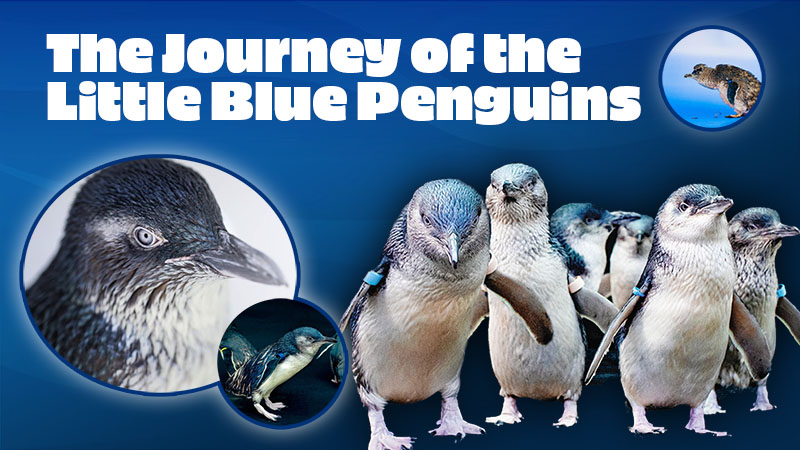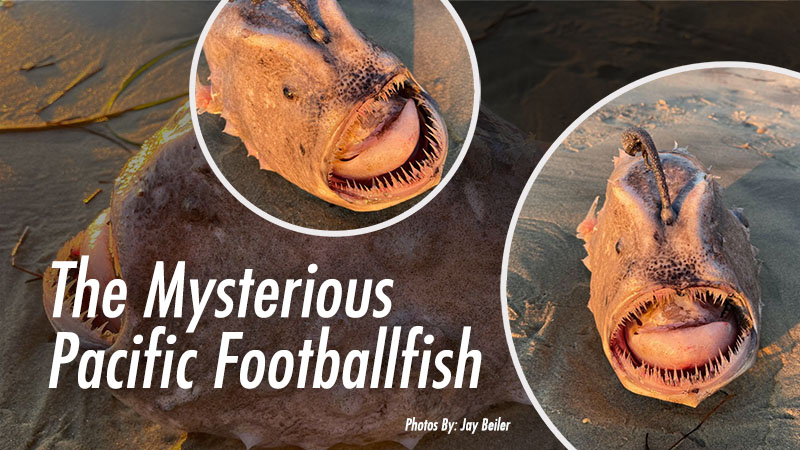-
Behind the Scenes of a Unique Ocean Research Simulator

As our climate continues to change, researchers need to understand the complicated chemical, biological, and physical processes that occur at the boundary between the ocean and the atmosphere. The Scripps Institution of Oceanography has a unique tool that allows scientists to simulate varying ocean environments by controlling winds, waves, water chemistry, temperature, light and more. […]
-
Little Blue Penguins Find New Home at Birch Aquarium

They are known for their big personalities and rather small stature. Standing less than 12 inches tall and weighing around 2 pounds, Little Blue Penguins are the smallest species of the flightless bird. While the population of Little Blues is considered stable in most locations, declines have been observed in some areas. While in the […]
-
The Story Behind the Elusive Pacific Footballfish

It looks like something out of a science fiction movie. A black blob with nightmarish spiny teeth, small black eyes, and prickly skin. A monster that never sees the light of day, using a bio-luminescent bulb swinging from its head to not only light its path, but also attract prey as well. The Pacific Footballfish […]
-
Oxygen Loss in the Ocean: The Blinding Truth
Ocean oxygen levels are changing globally as a result of both natural and human-influenced processes, and in some areas low oxygen events are becoming more common. While research on terrestrial animals has shown that low oxygen levels can affect vision – a vital function for finding food and shelter and avoiding predators – the impact […]
-
Our Impact on the Earth
“Mother Nature is not happy right now and she’s trying to tell us, in many ways,” says Kimberly Prather, Professor of Climate, Atmospheric Science, and Physical Oceanography at UC San Diego. New weather patterns and events are causing concern but how do we know these changes are caused by human activity? Climate scientists are looking […]
-
From Sea to Pharmacy
The vastness of the ocean is only surpassed by the biodiversity within it; from familiar and unfamiliar mega-fauna, to every microbe and virus inhabiting every corner of the seas – from the deep freeze of the Antarctic to the scorching plumes of volcanic seafloor vents. Paul Jensen describes how he and other researchers are tapping […]
-
Understanding the Arctic Climate System
The Arctic is changing rapidly in response to global climate and economic activity and yet much of it remains unexplored with modern scientific techniques. Jeff Bowman is a biological oceanographer who studies marine microbial communities. In this presentation at the Birch Aquarium at Scripps Institution of Oceanography he describes his group’s work in the Arctic […]
-
California Seaweed
Kelp cutters once harvested tons of the nearshore kelp off the San Diego County coastline, producing additives for your ice cream, beer and pharmaceuticals. And of course, anyone who has had a California Roll or a bowl of miso soup is familiar with the centuries-old use of Nori. But now Scripps researchers are working to […]
-
Eavesdropping on Whales
Since ancient seafarers first heard the strange calls of whales, humans have been fascinated by their meaning – from Flipper’s clicks and trills to the long serenades of Humpbacks. Inhabiting the dark ocean depths, whales use sound in many different ways – from feeding to navigating to finding friends and family. Join postdoctoral scholar Goldie […]